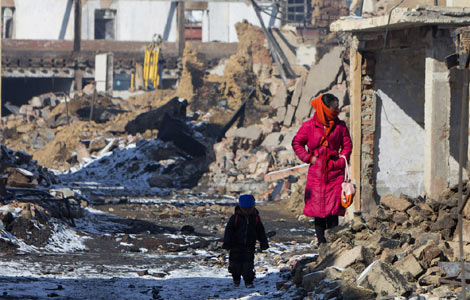Tunisia premier lacks consensus on new caretaker cabinet
Updated: 2014-01-26 11:36
(Agencies)
|
|||||||||||
TUNIS - Tunisia's new Prime Minister Mehdi Jomaa on Sunday was forced to delay naming a caretaker government to lead until elections after failing to reach a consensus over the key post of interior minister.
Jomaa, a technocrat, was appointed in December after ruling Islamists agreed to step down in a compromise with secular opponents to end a crisis threatening to upend democratic transition after their 2011 "Arab Spring" revolt.
Jomaa had planned to present his cabinet before the president on Saturday, but just after midnight the premier told at a press briefing there was no consensus over the cabinet list and he could not name the government.
"I have to inform the president that I do not have the list," he said. "It is not a question of a person, but rather I am looking for a real consensus in the government. There should not be any division."
He said the president could reassign him to the task of forming a new government or name another candidate.
It was a setback for Tunisia after its assembly finished the country's new constitution last week, progress widely praised as a model in contrast to upheaval in Libya, Egypt and Yemen who also ousted leaders in 2011 uprisings.
Party sources said Tunisian opposition leaders wanted to a new interior minister, but Jomaa pressed to keep the current minister to ensure continuity in key security matters as the country faces Islamist militants.
After months of deadlock last year, North African country's Islamist party Ennahda agreed to step down in a compromise deal to make way for a non-political, technocrat government to ease tensions and prepare for elections later this year.
One of the most secular countries in the Arab World, Tunisia has struggled with deepening divisions over the role of Islam and the rise of ultra-conservative Salafists, who secularists worried would infringe on liberal education and rights.
No date has been set for elections, but the new government will have to tackle demands from international lenders to cut public spending and curb the country's budget deficit without triggering protests over economic hardships.
Islamist militants, tied to al Qaeda operations in North Africa, are also a growing threat for a country that relies heavily on European tourism and overseas remittances for its hard currency income.
Related Stories
Tunisia's assembly appoints key electoral council 2014-01-09 09:13
Today's Top News
Terrorists behind twin explosions in Xinjiang
2014 diplomatic strategy outlined at Davos
China reports another H10N8 case
Big events in the Sino-French relations
IMF chief warns of risks to recovery
China Navy patrols Nansha islands
Uygur teacher involved in separatism
Li Na clinches Australian Open title
Hot Topics
Lunar probe , China growth forecasts, Emission rules get tougher, China seen through 'colored lens', International board,
Editor's Picks

|

|

|

|

|

|





